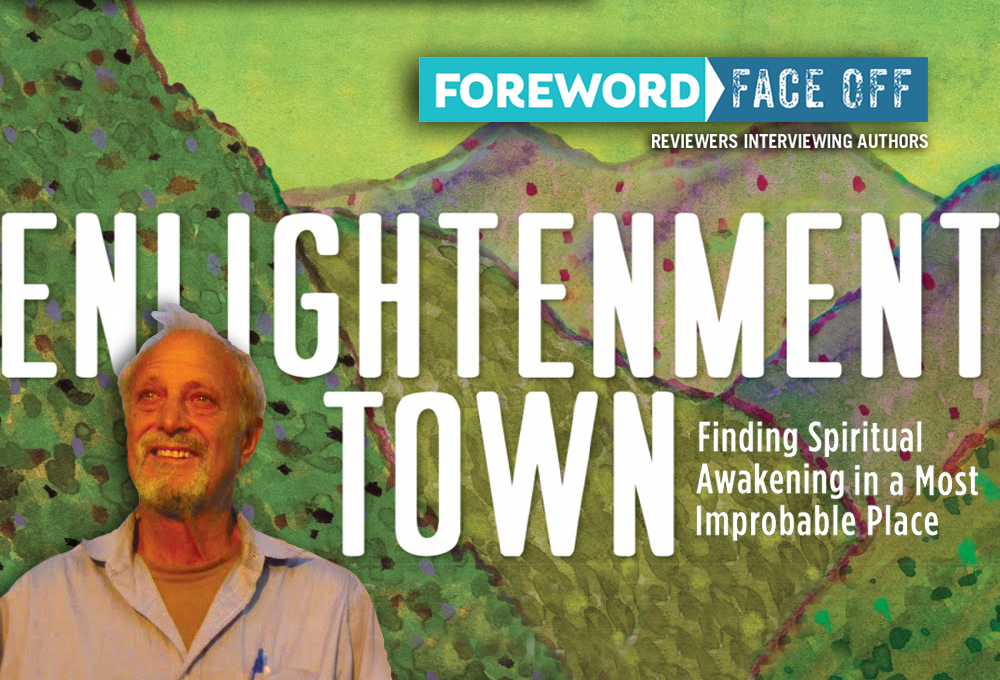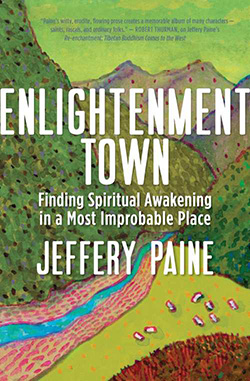Reviewer Katie Asher Interviews Author Jeffery Paine
Discusses Enlightenment Town: Finding Spiritual Awakening in a Most Improbable Place

Let’s say you’re the president of your town’s tourism bureau and you’d like to attract a few more visitors. Easy, right? Just start a PR campaign promoting some cool things to do and see in the region—art galleries, antique shops, craft breweries, world’s largest collection of bottle caps, mushroom festival, etc. And if your town is particularly endowed, like Crestone, Colorado, you can tempt visitors with a uniquely transformative experience: spiritual enlightenment. So, what’s going on in Crestone to substantiate that claim?

For hundreds if not thousands of years before European settlers started migrating across the American West, the Crestone region was known as a power spot to Native Americans, who imprinted the land with their spiritual blessings. Now the small town of just 150 people is home to many ashrams, temples, monasteries, retreat centers, and other spiritual landmarks representing twenty-five world religions—and they all get along.
Enlightenment Town: Finding Spiritual Awakening in a Most Improbable Place is the fascinating story of this extraordinary place. Recently, New World Library sent us a review copy and we instantly sent it off to reviewer Katie Asher for a review in our Religion Spotlight issue. When Katie expressed interest in an interview with the author, Jeffery Paine, we couldn’t say yes fast enough.
There are so many unique characters sprinkled throughout Crestone, Colorado—Galaxy being my absolute favorite. I definitely identified with her the most, and loved her background and life story. Who were you most close to in Crestone and why?
Favorite or closest? The way I write is by running embryonic thoughts through my body feelingly and thus the sentences form their particular shape. In that sense, all the characters are within me—can’t get much closer than that. And in the outside world some in Crestone have become dear close friends.
But if you mean favorite, then probably it was the eighty-something year-old potter and visionary, Bertha Gotterup. Life may offer few pleasures better than on a sunny afternoon sitting outdoors talking of anything and everything under the sun—no holds barred—with a wise old woman. Nothing you say will flatter Bertha, nothing will shock her, and she will delight in you no matter what. Though she notices your flaws, she will see beyond them to a better you than you can see in yourself. Whenever you are around Bertha, so people observe, you feel the universe is on your side.
I hope this is not too personal of a question, and you can skip the question if you prefer, but do you identify with one religion, and which would that be? Do you think that that specific viewpoint helped to write this book?
This book is in one sense old-fashioned, in that it often harks back to an older, once-almost-universal understanding of religion that makes little distinction between it and life itself or between natural and supernatural (holy). This is also, however, a newfangled book because its characters reveal quite contemporary methods for realizing the sacred in the world and in oneself.
In that spirit, I like reading about Tibetan Buddhism because it is the “religion” showing practical methods to reach your goals. And I like reading/studying/living it in conjunction with reading quantum mechanics and relativity theory, they complement one another so strikingly.
Contemporary physics lends the wild ideas of Tibetan Buddhism plausibility; Tibetan Buddhism provides the abstractions of physics an emotional human corollary. Together they open up visionary vistas vast enough to accommodate the largeness, depths, and oh-my surprises of anything that goes on in Crestone.
You touch briefly on your reasons for writing Enlightenment Town—because people need this type of story more than ever—but why, specifically, did you think it was important to tell people about Crestone? Why did you feel the need to share with strangers the personal experience that you had in this town?
Strictly entre nous it didn’t work that way. Of all the word-plays on Descartes’s “I think therefore I am,” my favorite is Kafka’s saying, “It thinks therefore I am not.” In this instance, “It” thought Crestone, therefore I went. In 2007, I wanted a fellowship to study science and religion at Cambridge so keenly that I asked myself what should I do if I don’t get it. Why did then a place I’d visited only briefly two decades before suddenly pop into my head, to go there and write about it.
An inspiration sometimes can seem to choose its subject, rather than the other way around. It would sound odd to say with that inexplicable “inspiration” that the book’s subject chose me. Yet places and things that have a magnetic appeal work in ways strange and wondrous to the perceiving outward eye. Only after I got there did I discover the good reasons for going there: that here was an author’s dream, to tell a story never told before, about all the world’s religions coming together, about the human spirit remaking itself in a dark time. (Incidental postscript: the next year I received the fellowship to Cambridge, but by then I wanted to experience and possibly write about Crestone.)
I assume that you have your own path in some sort of spirituality or religion. Do you think in writing this book, you achieved a deeper connection with your own spirituality?
You’d have to ask someone else, I try not to pry in such personal matters. However, for people genuinely on a “spiritual path,” anything they do, even hardships difficult to bear, may possibly in retrospect reveal their usefulness. At the very minimum, in Crestone, I felt myself going with the current; back in DC I struggle to swim against it. Far more convivial and fun, let me tell you, is going with the tide. But that doesn’t mean that swimming against it is less beneficial (providing as you hippity hop down the via negativa you don’t trip and fall down a bottomless hole).
Halfway through Enlightenment Town, I was certain that I wanted to go visit Crestone. Do you think in writing this book, you could possibly change the dynamic of Crestone, either negatively or positively? Do you feel a responsibility for changing the tourism there by writing this book?
Is not to worry. For better or worse—and it may be for the better—the book did not receive a strong birth-push into the world, consequently it won’t endanger life-as-it-is-now in Crestone. Yet I do share the concern couched in the question. Quite likely in the not distant future a popular film or TV series about this remarkable place will be made, and the gates of change will fling wide open.
Spiritual tourism, however, may not be entirely undesirable in a place where there’s limited ways to earn a living. Yet more and more—until by midcentury, most—people on the globe will be in dire need of water. And the valley bordering Crestone sits atop the largest untapped aquifer in the continental US, the draining of which would wreak havoc on the area. The question is, can any place unique and fragilely wonderful survive the avalanche of inexorable population deluge?
As a visitor to Crestone in the very early stages of the town becoming this religious mecca, do you truly believe it is an improbable place for enlightenment, as the title suggests? Is any one place better or more suited than others to host this set of religious followers and unique spiritual structure?
A remote old wild-west hamlet, fading into the dust and about to blow away, becomes instead a center for the world’s religions—what could be more farfetched? Of course once the implausible happens, it begins to look plausible and may even gather a (probably false) aura of inevitability.
The question is: Why did once so many Native Americans—and now Tibetan masters—make pilgrimages to this area. Native American geomancy found all the natural elements present to make this area the perfect place to pray, to meditate, to fast, and to die. And so they made pilgrimages here, and over the centuries, so I was told, it seeded the ground with blessings and infused the atmosphere with their lingering prayers.
How can anyone test a hypothesis like that! My own homespun measure of a place’s sacredness is whether it makes its citizenry consistently more thoughtful, more generous, and lighter and kinder. Crestonians, in my unofficial census, often do display more helpfulness, open-mindedness, and playfulness than other locales I know. And if that is not sacredness, it will do.
Katie Asher
